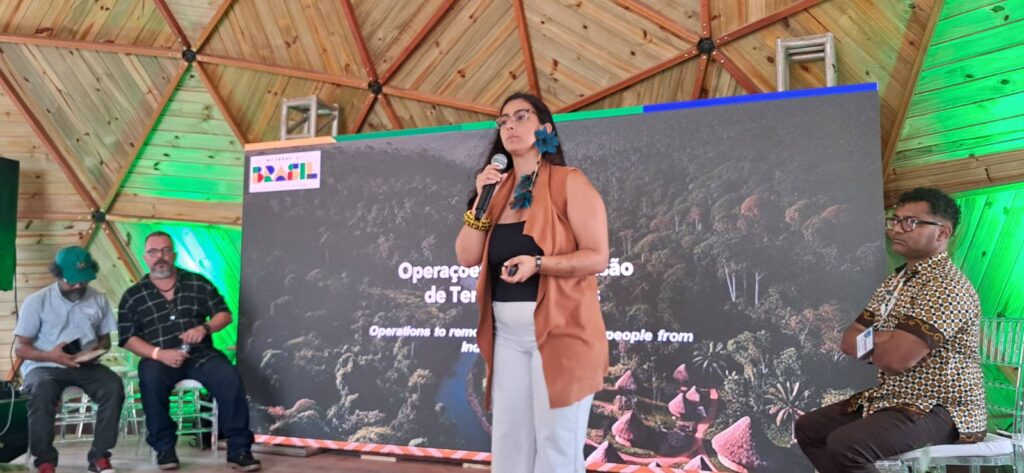As he boarded a commercial bus in Boa Vista, Roraima, heading for Manaus, Amazonas, Raimundo had no idea that he was being awaited by Federal Police agents at the bus station. When he reached his destination, he was surprised by the police, who had been investigating him on account of a cocaine trafficking tip-off.
No drug was not found with Raimundo, but he carried two gold bars weighing approximately 800 grams, taken from the Yanomami Indigenous Territory – the result of illegal mining, according to Brazilian legislation, which prohibits mining activities in indigenous areas or reservations. The gold would be delivered to taxi driver Paulo Clemente Lopes, identified by the Federal Police as a representative of the company Ourominas in Manaus.
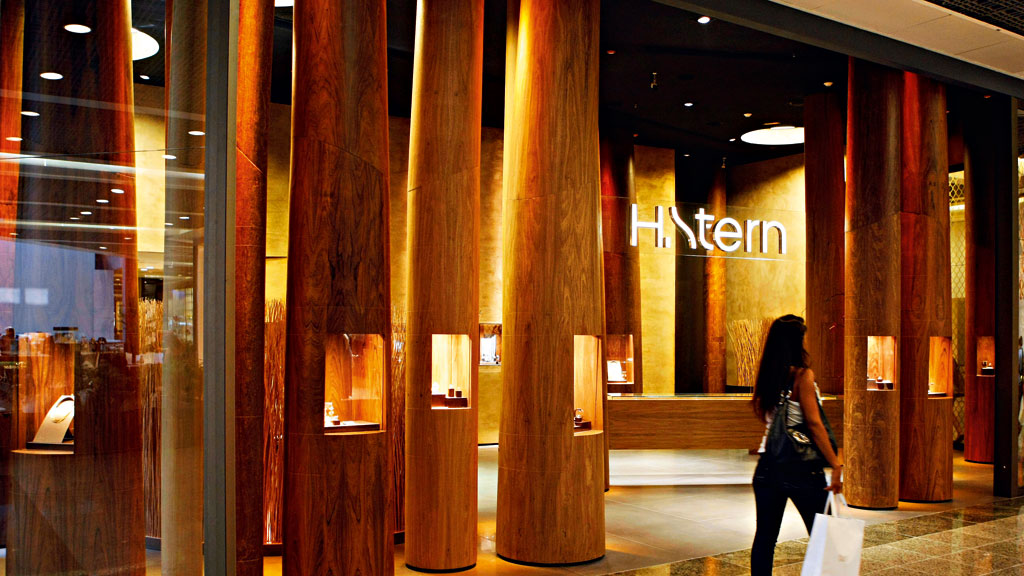
Even before this incident, which took place in April 2015, Ourominas and its representative, Paulo Clemente, had been in the crosshairs of police officers. Paulo Clemente had been identified by a gold middleman who had been approached by military police officers on a bus trip crossing the border between Roraima and Amazonas, when he stated that the R$90,000 in cash that he carried – part of which was found lodged in his underwear – was the result of the sale of 1 kilo of gold to the Ourominas representative.
Raimundo and the middleman caught with cash stashed in his underwear traveled to Manaus as employees of the company Gold Jóias, one of dozens of businesses that buy and sell gold extracted from TI Yanomami at the so-called Rua do Ouro (Gold Street), in Boa Vista. Phone conversations show intense negotiations between Paulo Clemente, from Ourominas, and the owners of Gold Jóias: Andreia Cavalcanti Lima and Manoel Pereira Souza Neto. All had been indicted by the Federal Public Prosecutors’ Office (MPF) in 2017 due to crimes against the economic order. The store continues to operate normally. Ourominas does too.
Read the article about Rua do Ouro, in Boa Vista
The records of Federal Police investigations made available to Repórter Brasil under the Access to Information Law have identified some of the different companies involved in the purchase of gold originating from TI Yanomami. Together, the records of the investigations amount to over 5,000 pages that show how the sale of metal gains a veneer of legality, despite its illegal origins.
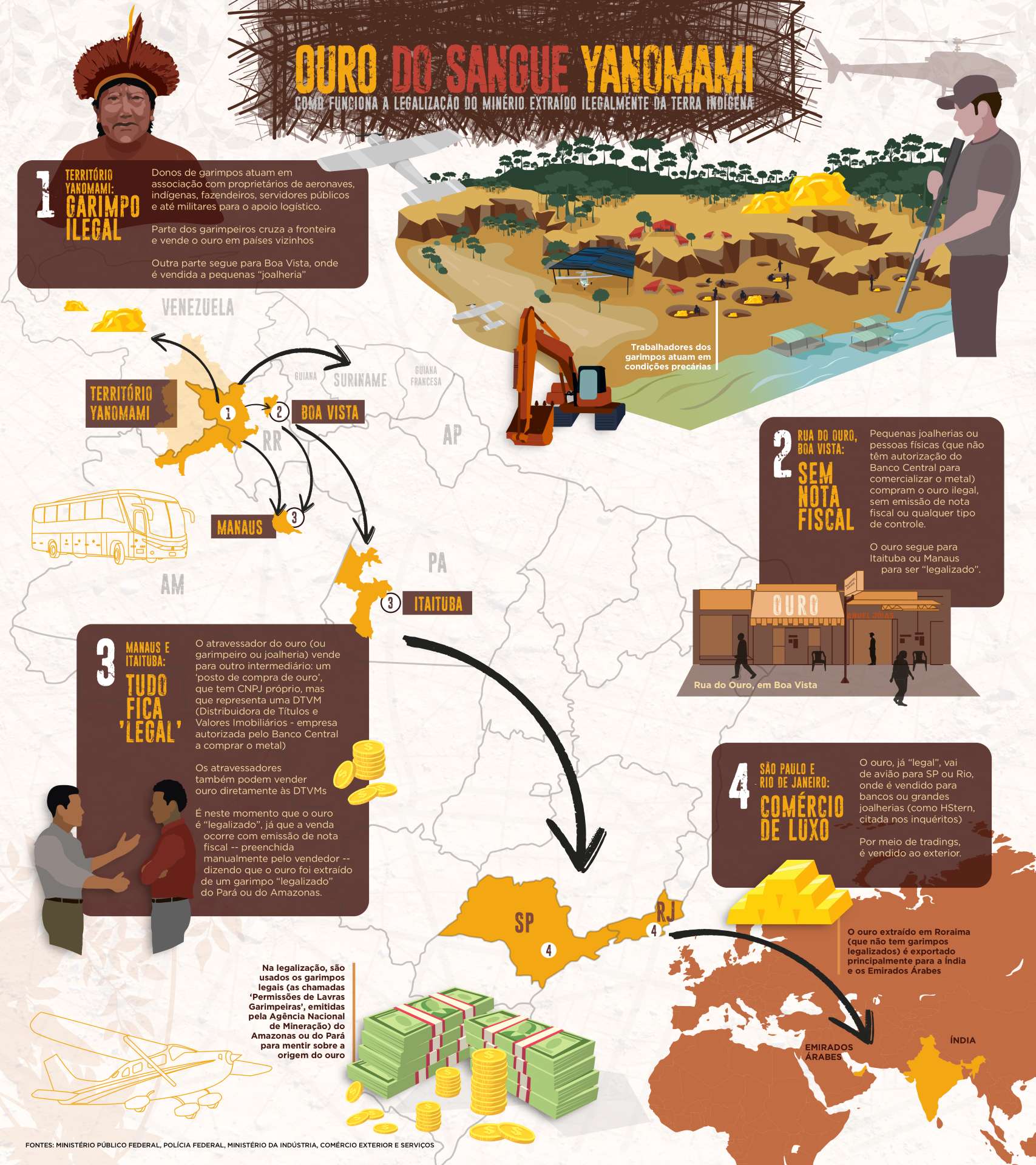
The scheme involves both small gold stores, such as Gold Joias, DU Gold, Naza Joias and Itaituba Metais and larger companies, based in São Paulo and Rio de Janeiro. In addition to Ourominas, Dillon, Carol, FD’Gold and Coluna are also suspected of irregularities. These are known as Securities Distributors (DTVMs) – companies that are part of the financial system which have authorization from the Central Bank to buy gold. A major jewelry chain, HStern, was also mentioned at least twice in the records of the Federal Police investigations.
The documents also shed light on how the clandestine scheme works. First, some of the illegally mined Yanomami gold goes directly to neighboring countries (Venezuela, Suriname and French Guiana) to be sold. Another part goes to Boa Vista, where it is purchased by the small jewelry stores on Rua do Ouro – even though they lack the Central Bank’s license to buy gold.
These middlemen, in turn, usually go to Manaus or Itaituba (Pará), where gold is sold to the DTVMs. Legalization takes place mainly in these two cities in a “grotesque” manner, in the words of the MPF prosecutor in Itaituba, Paulo de Tarso. When the middleman sells to a DTVM, he manually fills out an invoice declaring that the gold came from a legal mine – those covered by the so-called Permissão de Lavras Garimpeiras, which are mines whose activities are authorized by the National Mining Agency (ANM). As there are no legal mines in Roraima, the middlemen declare that the gold originating from TI Yanomami actually came from mines in Pará and Amazonas.
Using these fabricated invoices, the gold in the possession of the DTVMs becomes “legalized”. From then on, this gold can be freely traded – sold to both financial institutions and large jewelry stores, both locally and overseas.
There are five DTVMs that appear, in different contexts, in the PF documents that resulted from three large joint operations to combat illegal gold mining in TI Yanomami: Xawara (2012), Koxi (2015) and Tori (2017), also used as a basis for the indictments. The unprecedented investigation by Repórter Brasil shows that gold tainted by Yanomami blood circulates freely, benefiting from the fragile legislation that regulates the sector.
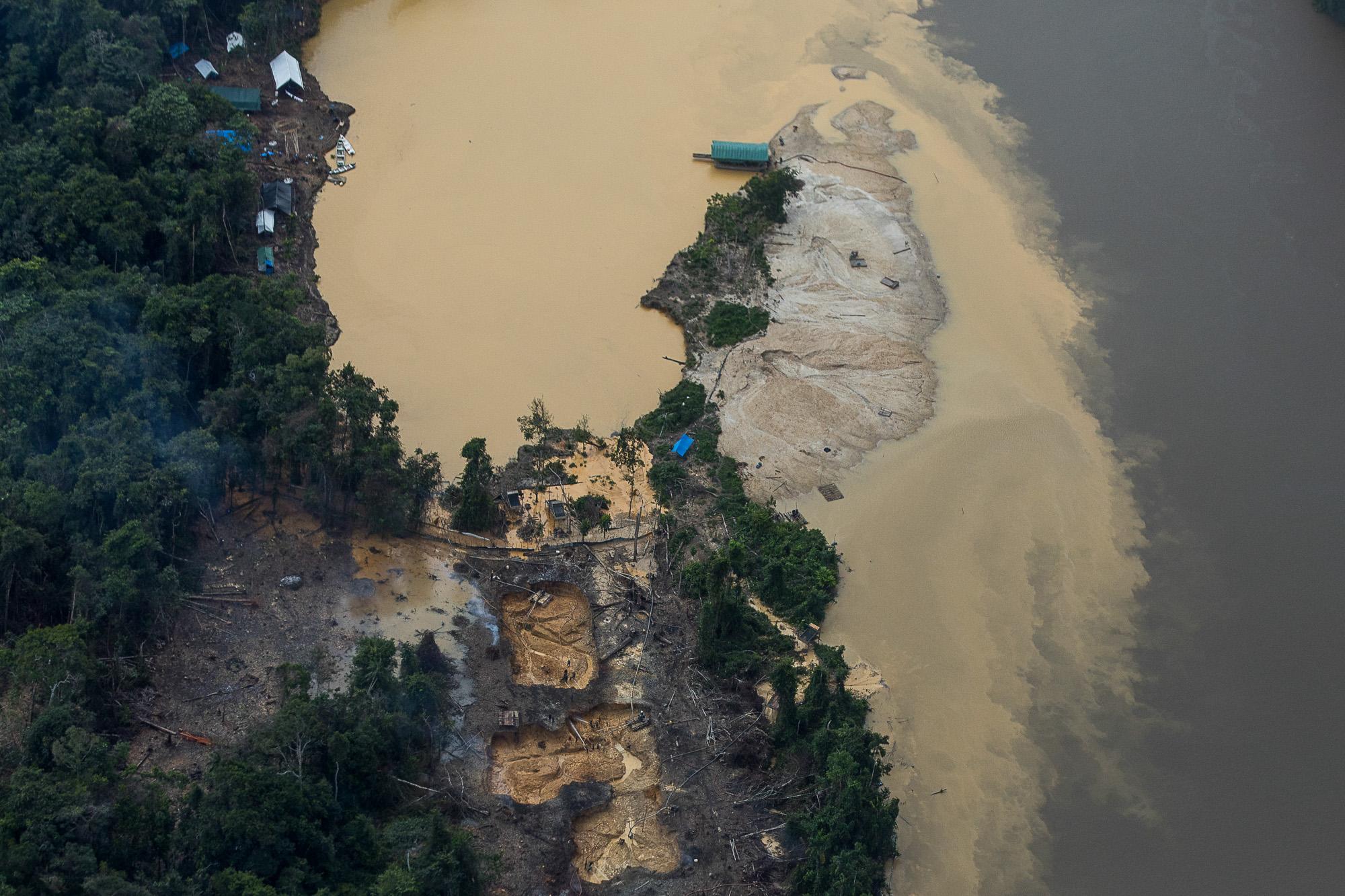
Law No.12,844/2013, which regulates the purchase, sale and transport of gold in the country, states that the sale of gold relies on the good faith of the seller – thus exempting buyers from any responsibility. In addition, information about the origin of the gold is self-declared (by the seller) when filling out the invoice, which means that this is a fraud-prone scheme.
“The claims made by gold buyers [about their innocence] are based on this [the law], responsibility is imputed to sellers”, says federal prosecutor Paulo de Tarso. “The owner of a DTVM that buys gold can acquire illegally sourced metal relying on a presumed good faith, and the seller is responsible for stating where the gold comes from. In short: a company like Ourominas is the buyer and whoever sold the gold was the one who lied, according to the law”, he concludes.
In addition to criticizing the legal framework surrounding the gold market in Brazil, the prosecutor also disapproves of the lack of inspection by the ANM on the mining permits and gold transactions, the issuance of (municipal and state) environmental licenses for mining operations (an activity that is considered, by law, as low-impact) and the fact that the Central Bank only inspects DTVMs (which excludes small intermediary companies). “We have a very truncated legislation”, criticizes the prosecutor in an interview with Repórter Brasil.
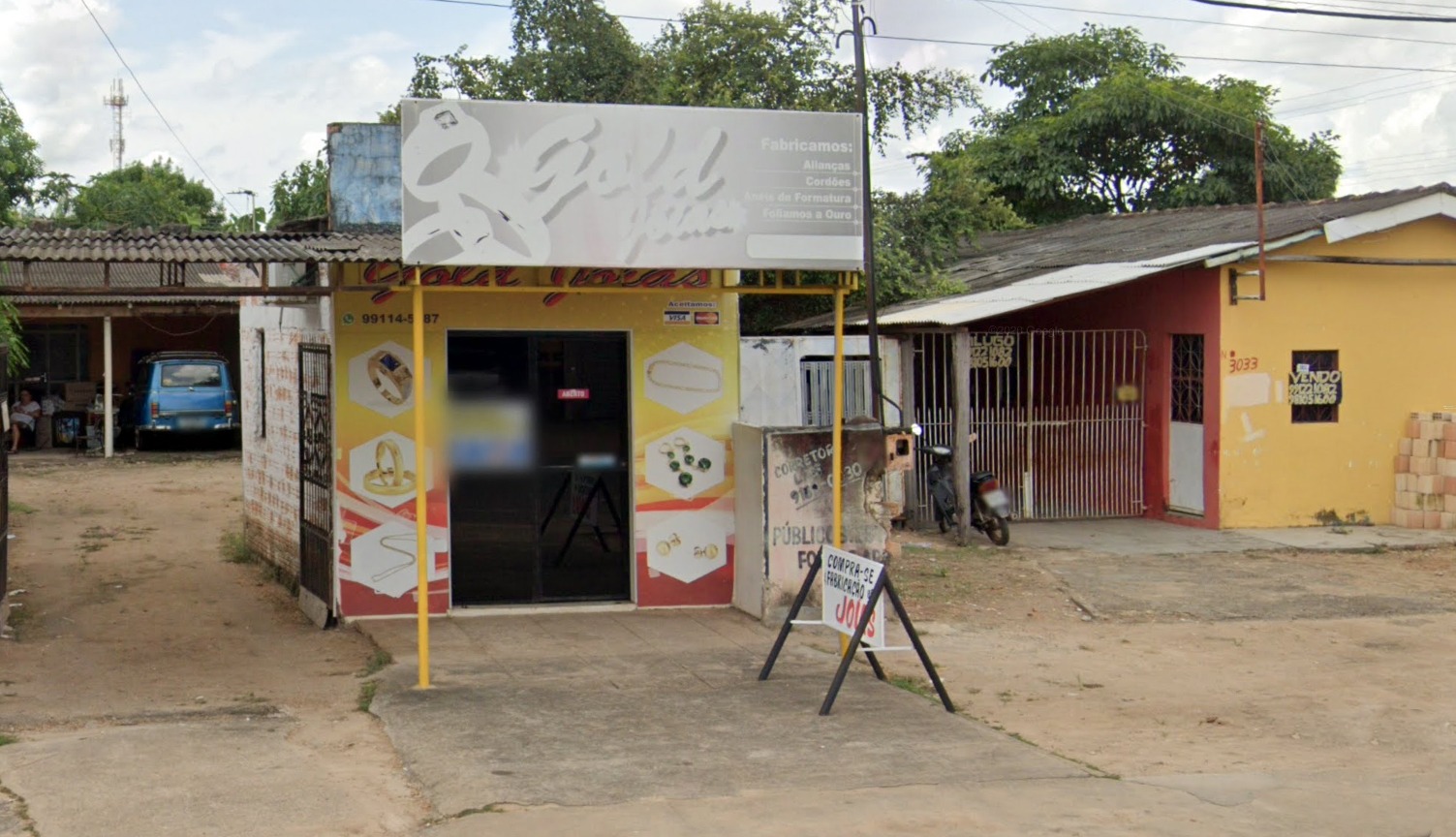
At least 49 tons of illegal gold in the country were laundered between 2019 and 2020, i.e., their origin was concealed and the gold was introduced into trade as a legal product, according to a study by the Federal University of Minas Gerais carried out at the request of the MPF. This laundering of gold generated a socio-environmental loss in the amount of R$9.8 billion for the Amazon, according to the researchers.
References to HStern
Regarded as one of the major jewelry chains in the world, HStern is mentioned by Paulo Clemente, from Ourominas, in a conversation tapped by the Federal Police. The company was founded in Rio de Janeiro in 1945 and today has stores in New York, Moscow and London. It is known for producing luxurious pieces, that have been worn by Angelina Jolie and Beyoncé. The brand’s gold rings can cost up to R$29 thousand. But part of Hstern’s production uses gold mined at TI Yanomami.
In a conversation in April 2015, recorded by the police, Paulo Clemente asked Andreia Cavalcanti Lima, owner of Gold Joias, in Boa Vista, to set aside 5 kilos of gold for a trip to São Paulo that would take place in the near future. Paulo Clemente said that a meeting was scheduled “with HStern people” during that trip, without specifying the individuals who would attend the meeting.
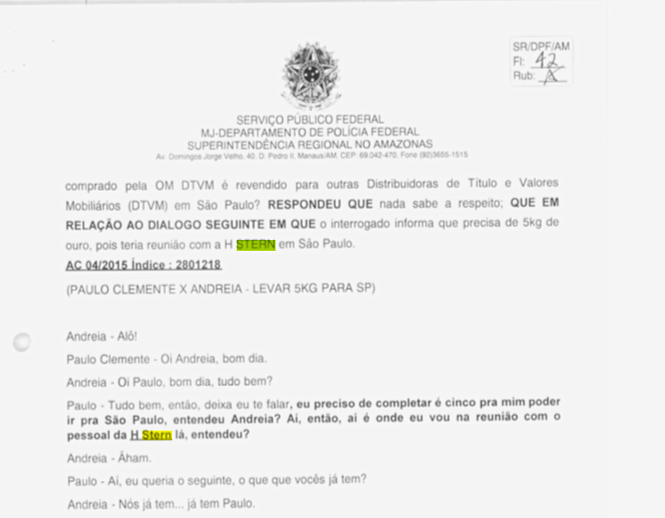
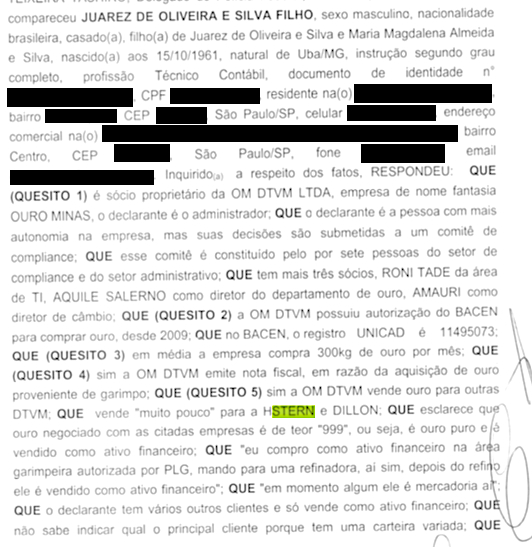
In other occasion, the partner and founder of Ourominas, Juarez de Oliveira Filho, also makes reference to HStern in a statement he gave to investigators. When asked by the Federal Police whether he sold gold to the jewelry chain, he did not deny it, saying only that he “sold very little” to that company.
Despite the tapped conversation, Paulo Clemente told the Federal Police that he did not remember the dialogue with Andréia and that he did not know HStern representatives either. No H.Stern employee was heard by the Federal Police during its investigations.
Asked about the negotiations with HStern, Ourominas informed that “commercial information is protected by fiscal and banking secrecy”. HStern did not respond to repeated attempts of email and telephone contact made by Repórter Brasil.
The millionaire lobbyist
If, on the one hand, illegal gold extracted from indigenous lands may be found in the windows of a luxury jewelry store, on the other hand, this same gold is enriching different players involved in the scheme. One of the main cores of the scheme would be the DTVMs. Repórter Brasil analyzed the financial statements of three DTVMs that have already been investigated by the Federal Police. The one that showed the highest profitability last year was F.D’Gold: the company declared net profits of R$ 32.8 million in 2020.
Its owner, Dirceu Frederico Sobrinho, also owns of a small fortune resulting from decades of mining work. In 2018, he ran for the office of 1st alternate of senator Flexa Ribeiro (PSDB-PA), declaring a personal net worth of R$ 20.3 million. In addition to apartments in São Paulo and farms in Pará, his assets include a backhoe (with a declared value of R$450 thousand) and 50% of the shares of F.D’Gold, with a value of R$2 million.
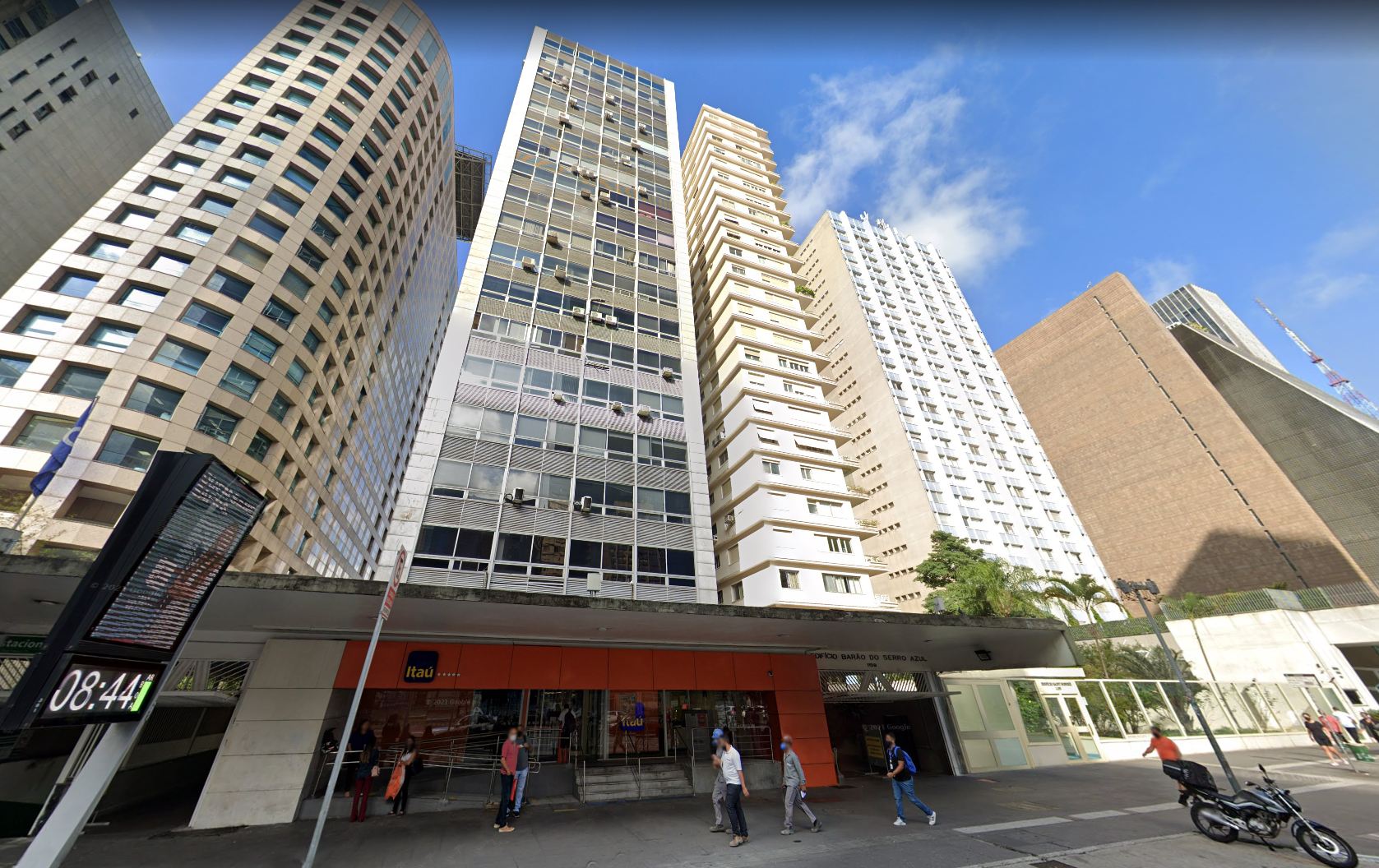
In addition to F.D’ Gold, Dirceu Sobrinho owns D’Gold and Mineradora Ouro Roxo. He also holds 32 mining permits, 29 of them in Itaituba and another three in Jacareacanga, Pará, obtained between 1995 and 2007. The city in Pará has been the site of illegal mining activities carried out at the Munduruku Indigenous Land , as reported by Amazônia Real.
“Dirceu controls almost the entire chain, as he owns the mine, the small stores that buy the gold and one of the largest DTVMs in the country”, said a source who asked not to be identified.
Since 2013, Dirceu Sobrinho has been chairman of Anoro (the National Gold Association), an entity that brings together sector member companies and a vocal advocate for the licensing of mining activities on indigenous lands.
The businessman enjoys a good reputation among representatives of the highest echelon of the administration of President Jair Bolsonaro (no party). He met with Vice President Hamilton Mourão in July 2019 to defend mining on indigenous lands. Another visit to the Planalto Palace took place two months later, in a meeting with Onyx Lorenzoni (General Secretariat), Ricardo Salles (then Environment Minister) and retired General Augusto Heleno (Institutional Security Office ), as reported by Época magazine.
“The owner of F.D’Gold DTVM, the country’s third-largest payer of CFEM [tax] on gold mining in the first four months of 2020, the chairman of Anoro is the most vocal lobbyist for the legalization of mining activities, with which he has been involved since the eighties”, said a study published by Instituto Escolhas, an organization that acts in the defense of better regulation of the sector and traceability of ore.
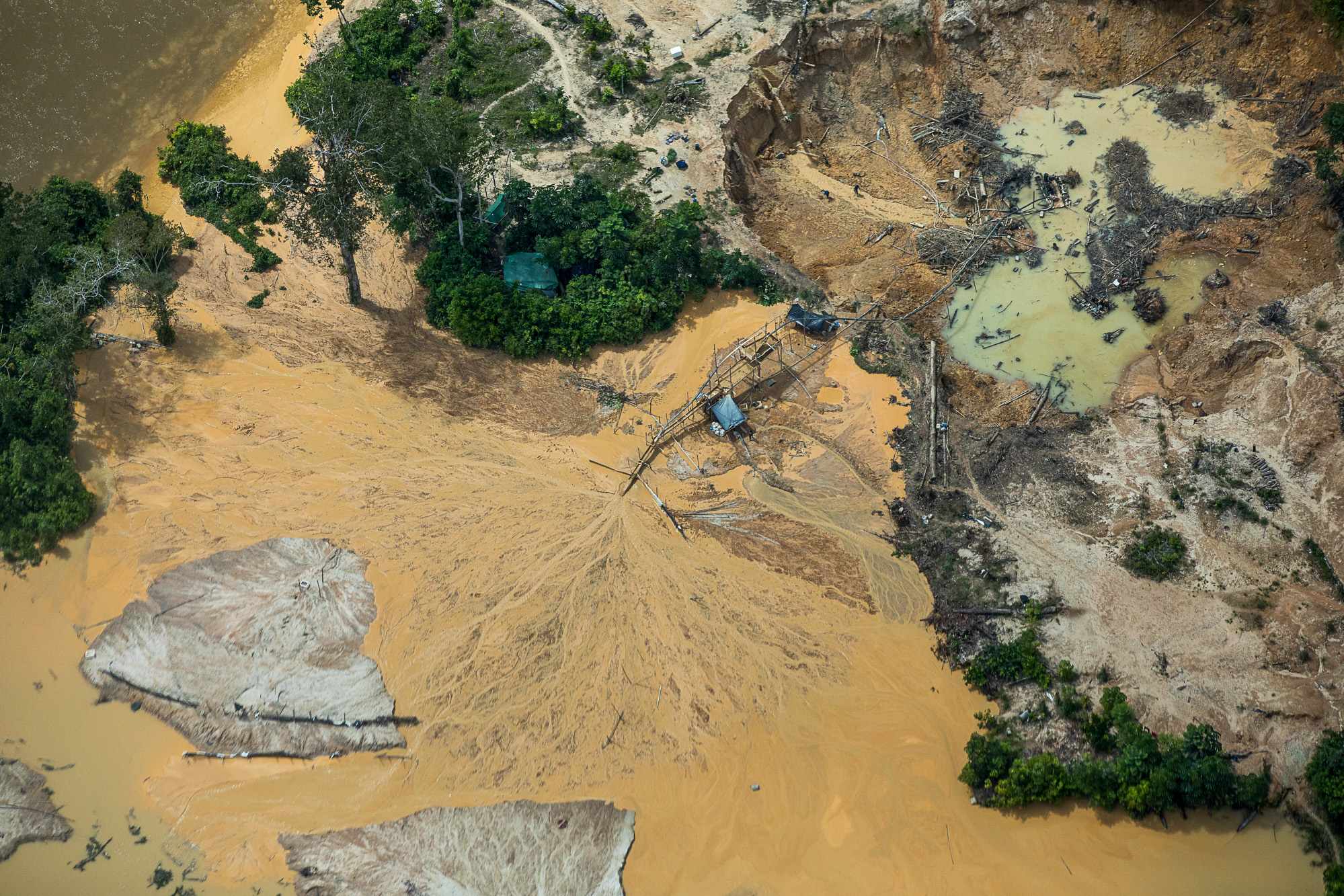
Sobrinho, who is a former secretary of the Environment for Itaituba, has been sued for environmental damages in the Tapajós Environmental Protection Area, in the Pará municipalities of Jacareacanga and Itaituba.
In the records of the case that charged him with “crimes of money laundering or hiding of assets”, the lobbyist obtained a habeas corpus, in 2019, leading to the dismissal of the Federal Police investigation on atypical financial transactions detected by Coaf (the Council for Control of Financial Activities) relating to the F. D’ Gold accounts between 2013 and 2014.
“There is a difficulty in producing evidence [to incriminate illegal buyers]”, says Larissa Rodrigues, project manager at Instituto Escolhas. “The Federal Police arrives at a small store in Itaituba, which they know is fraudulent, only to find a heap of papers, with several Mining Permit numbers. They would have to inspect all of those small stores to produce evidence, except that the gold is coming from somewhere else. Without the traceability of gold, which does not exist today, there is nothing to do”.
The specialist also claims that, oftentimes, the owners of legal mines encourage the exploration of the metal in prohibited areas to “launder the gold” – and guarantee their own gains. “It’s similar to what happens with soy and cattle. You mix soy or cattle produced in illegal areas with soy or cattle from the legal areas and then there’s no telling them apart”.
The researcher also highlights the ease of transporting the metal and its valorization in recent years, which encourages illegal activity. “If there’s fraud with logging, which involves huge pieces of wood, imagine with gold, which you can hide in your pocket”, she analyzes.
There is also another link in the chain that makes inspection and investigations difficult in the sector: the so-called Gold Purchase Stations, which operate as “arms” of the DTVMs, established in places outside the company’s headquarters – predominantly in cities like Manaus or Itaituba. The problem is that the purchase stations can be operated by other entities, with different CNPJs, which makes the chain all the more complex.
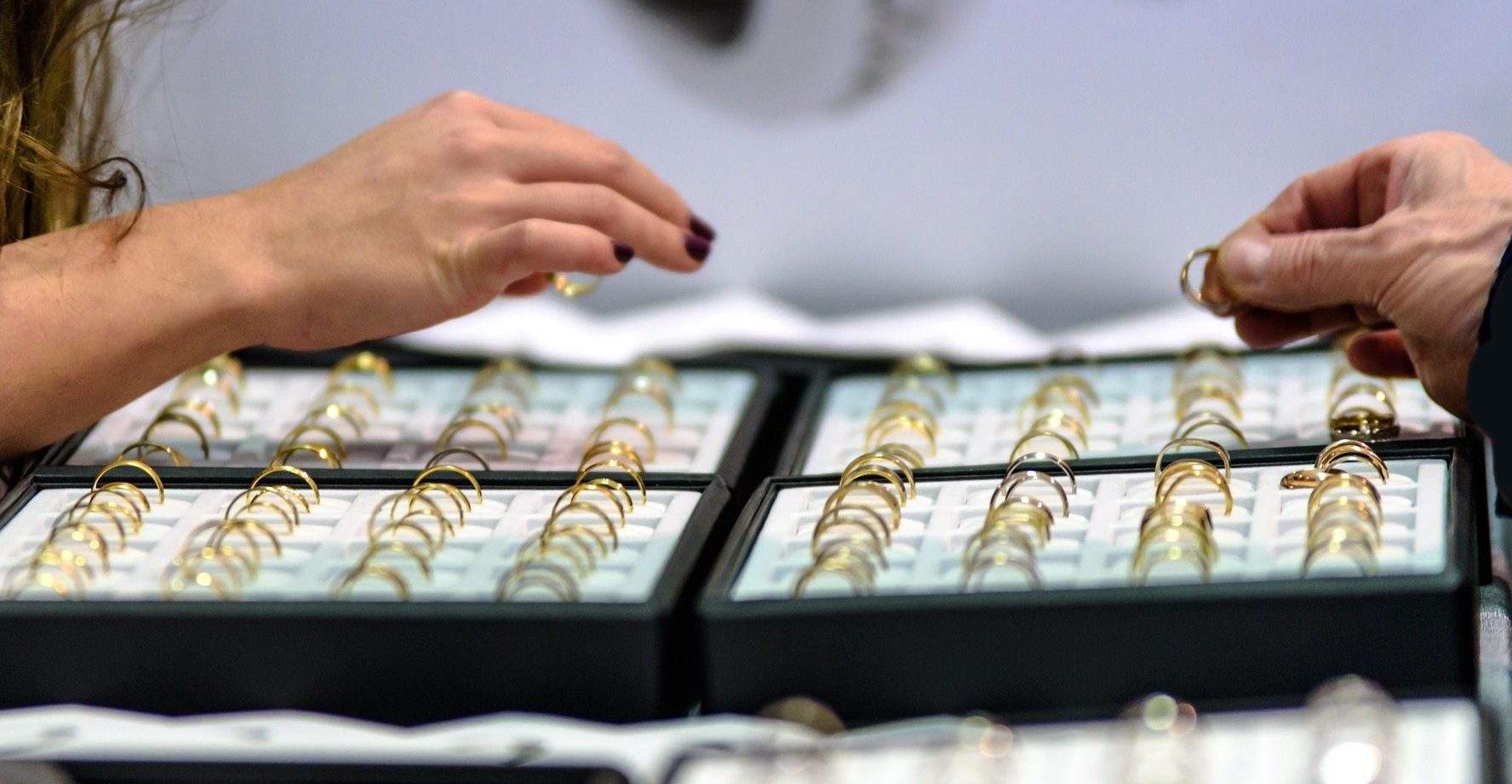
In a statement, Dirceu Sobrinho said that his companies “strictly follow all current laws and do not condone the illegal extraction of gold, actively fighting any irregular and/or illegal action” and that “all company actions were duly registered in detail and, thus, there are no grounds to maintain an investigation”. Sobrinho also stated, through his press office, that “it is necessary to focus on regulating the mining activity in the permitted areas, respecting the current legislation. Regularization is a priority for the entire sector and must also be so for Brazilian society as a whole”. Read the full statement here.
The scheming Ourominas
Created in the early 1980s, when Juarez de Oliveira Filho started earning money as a miner in Mato Grosso, today Ourominas has more than 80 stores across the country. Headquartered in São Paulo, but with so-called Gold Purchase Stations in cities such as Itaituba (PA) and Peixoto de Azevedo (MT), the company had a declared net income of R$ 498 thousand in the first half of 2019, according to the company’s published balance sheet.

The businessman accumulates good results from his activities in the sector but is also facing legal challenges. Oliveira Filho is a defendant in at least six lawsuits under the jurisdiction of TRF 1, which involve work analogous to slavery, environmental damages, misrepresentation, smuggling, money laundering and concealing of assets.
His company was also indicted by the MPF in a public civil action in July 2019, accused of acquiring illegal gold in the region of Óbidos (Pará), close to the Z’oé Indigenous Land. At the time, the branch of Ourominas in Santarém bought almost 611 kilos of illegal gold, in operations totaling around R$ 70 million.
According to the Amazon Task Force, the Ourominas Gold Purchasing Station in Santarém had a scheme set up to facilitate metal laundering: it maintained a database with information on legalized mines to be used in invoices to disguise the actual origin of the illegal gold. In this case, it was the buyer (Ourominas) itself that filled in the fraudulent information, making seller’s life easier.
The majority partner of Ourominas was also the target of the Minamata operation, launched by the Federal Police in 2017 to investigate the possible cooptation of the Cooperativa de Garimpeiros do Lourenço Ltda (Coogal) by politicians and businessmen, including Juarez de Oliveira Filho. Cooperative workers were found to be subjected to slavery-like conditions by labor inspectors (Ministry of Economy), and there are indications that mining activities in Calçoene (Amapá) have contaminated the region’s rivers through the use of mercury.
Documents relating to TI Yanomami also raise the suspicion that businessmen from Ourominas may have benefited from privileged information during the investigations into illegal mining in the region. In 2015, in the early morning hours before the Federal Police’s search and seizure operation took place, Juarez asked Aquiles Pereira Salerno Junior, also a partner in the company, to go to one of the offices and “check if everything was right” because “surely the police would be heading there”.
An hour later, an employee of Ourominas, Paulo Clemente’s wife, called the company’s second-in-command detailing the search conducted by the Federal Police at her home. Achilles asked her to erase all records of phone calls from her phone. In the afternoon, Paulo Clemente called Aquiles and said he had denied any employment relationship with Ourominas but revealed that “the pressure was on”.
Among the partners of Ourominas, only Aquiles Salerno was indicted by the MPF as a result of the Warari Koxi operation, due to an attempt to destroy evidence. The Federal Police discovered that Paulo Clemente’s wife gave up her own cell phone during the search and seizure but hid her husband’s phone.
‘The difficulty in holding certain companies criminally responsible is also due to the fact that the owner of Ourominas, for example, is domiciled in São Paulo. He does not buy [gold] directly. He has a local partner who gets his hands dirty. If things go wrong, he will say that he didn’t know what was going on.’ Paulo de Tarso
Alisson Marugal, who is also federal prosecutor, from the MPF in Roraima, who specializes in indigenous issues, agrees that it is difficult to produce documents that incriminate large businessmen involved in illegal mining. “There is a flaw in the investigations, which have yet to reach these major players. There are businessmen in the air transportation sector, politicians… On the other hand, it must be said that there is a very large number of people who pursue mining activities. When they dismantle a criminal cell, three or four appear in its place. More efficiency is needed, especially when it comes to major players”, he told Repórter Brasil.
Ourominas stated, in a note, that “after a long inquisitorial and investigative phase that takes place during the police investigation, it was concluded that neither the company OM nor its partners participated in the investigated conducts and, therefore, they are not parties to the criminal action, i.e., they are not defendants in the case”.
Nevertheless, a survey carried out in the TRF 1 database shows that Aquiles Salerno, the company’s second-in-command, is a defendant in at least two lawsuits: one for “crimes against the economic order” and another for “crimes of money laundering or hiding of assets”. Besides Salerno, Paulo Clemente Lopes is also a defendant in a lawsuit originating in “crimes against the economic order”. Regarding these cases, all that Ourominas said was that they were subject to court secrecy and that, in the case of Salerno, “all information will be provided in court”.
Asked again about the processes involving one of the company’s partners, Ourominas repeated that “all information will be provided in court”. The company also said that “it does not condone slavery-like work conditions” and that “according to a court decision, all assets were returned/released”. Read the full statement here.
In addition to the abovementioned involvement of Ourominas and HStern in the purchase of illegal gold, the investigations conducted as part of the Warari Koxi operation also points to another DTVM: Dillon, which declared a net profit of R$ 692 thousand in the 2nd half of 2020. The company used Naza Jóias store, in Boa Vista, as a “branch” to buy gold extracted from TI Yanomami.
“Dillon, directly and indirectly, financed illegal mining activities in the State of Roraima”, said the Federal Police in one of the investigations. Documents found at the company’s headquarters in Rio de Janeiro showed that such DTVM made bank transfers to representatives of Naza Joias and Du Gold, stores in Boa Vista identified as buyers of Yanomami gold.
Eduardo Freire da Silva Filho, a partner at Du Gold, was indicted for crimes against the environment following the Xawara operation. Chairman and majority shareholder of Dillon, Luis Claudio Lins Fabbriani is a defendant in a lawsuit for money laundering and concealment of assets and the imposition of slavery-lie work conditions in the Coogal case, in Amapá.
Maria Nazaré, from Naza Joias, and Eduardo Freire, from Du Gold, informed through their lawyers that they will not make a statement on this issue. Francisco Picorelli, Compliance Director at Dillon, informed by phone that the case was being analyzed by the company’s partners. So far, there has been no response to Repórter Brasil‘s questions.
Invoices and traces of the illegal scheme
Investigations into a single smuggler helped the Federal police obtain some of what little evidence has been produced as a result of these operations. These are invoices found at the home of Rafael Vieira, an employee of Itaituba Metais, corresponding to the sale of TI Yanomami gold to three DTVMs: R$ 44,000 (356g) to Carol DTVM, based in São Paulo, R$ 20,000 (170g) to Coluna DTVM, headquartered in Rio de Janeiro and R$ 8,800 (79g) to D’Gold, one of Dirceu Sobrinho’s business arms.
Unlike in previous cases, in which purchasing stations were registered in the name of third parties, in this case the station is registered in the name of Dirceu Sobrinho and his daughter, Sarah Almeida Frederico.
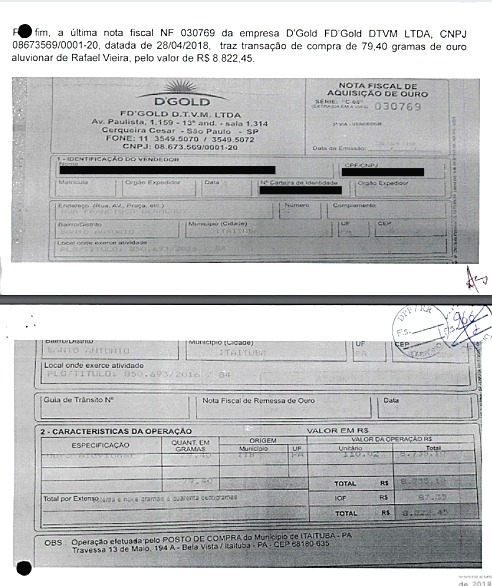
This episode illustrates well what prosecutors and experts criticize about the weakness of the law – which protects buyers – and the difficulty in producing evidence. Only the employees of Itaituba Metais, Rafael Vieira and the owner Leandro de Sousa Rodrigues (sellers), were indicted by the Public Prosecutors’ Office as a result of the Tori operation, for misappropriation of assets belonging to the Federal Government. The DTVMs (buyers) were left alone.
Coluna DTVM told Repórter Brasil that it “is unaware of the allegations of purchase of gold from indigenous reserves” and that it has not been summoned by the Federal Police or by the Public Prosecutors’ Office. Read the full statement here. Carol DTVM did not respond to the reporter’s questions.
Dirceu Sobrinho did not answer questions about the invoices relating to the purchase of gold from Itaituba Metais either. Through his lawyer, Leandro de Sousa Rodrigues, the founder of the company, informed that he would not make a statement. Rafael Vieira’s defense could not be reached.
The Central Bank told the reporters it would not issue a comment on this issue.
The ANM press office claimed that it could not answer, as it was not aware of cases involving the miners used to “launder” illegal gold.
“There is a very strong lobby, because these businessmen, linked to Anoro [the National Gold Association], are behind the laws that govern the sector. They designed the system, which exempt them from criminal responsibility”, says prosecutor Tarso, noting that the problem is that the law exempts buyers – and there are many of them.
If you’ve come this far and found that there are too many parties involved in the scheme, you’re right. According to specialists, the structure of illegal mining at TI Yanomami is based on a series of nuclei, with different people getting rich in each one of them. Regarding the universe of small middlemen companies, many of the names investigated by the Federal Police or indicted by the Prosecutors’ Office are not mentioned here. Our focus was on larger companies, the DTVMs and their respective intermediaries.
Precisely because of the complexity of the logistics, as well as the profusion of actors involved in the scheme, the Federal Public Prosecutor in Roraima, Alisson Marugal, believes that only “a real war operation could end illegal mining in indigenous lands”.
*In collaboration with Piero Locatelli
Yanomami Blood Gold Teams
Amazônia Real: Kátia Brasil (executive editor); Eduardo Nunomura (special editor); Alberto Cesar Araujo (photography editor), Elaíze Farias (content editor); Maria Fernanda Ribeiro, Clara Britto and Alicia Lobato (reporters); Bruno Kelly (flight photographer) and Paulo Dessana (photographer); Lívia Lemos (social media); Maria Cecília Costa (executive assistant); Giovanny Vera (maps); César Nogueira (editing); Nelson Mota (developer); and Ana Cecilia Maranhão Godoy (translator).
Repórter Brasil: Ana Magalhães (journalism coordinator); Mariana Della Barba (editor); Mayra Sartorato (social media editor); Piero Locatelli and Guilherme Henrique (reporters); Joyce Cardoso (intern).
